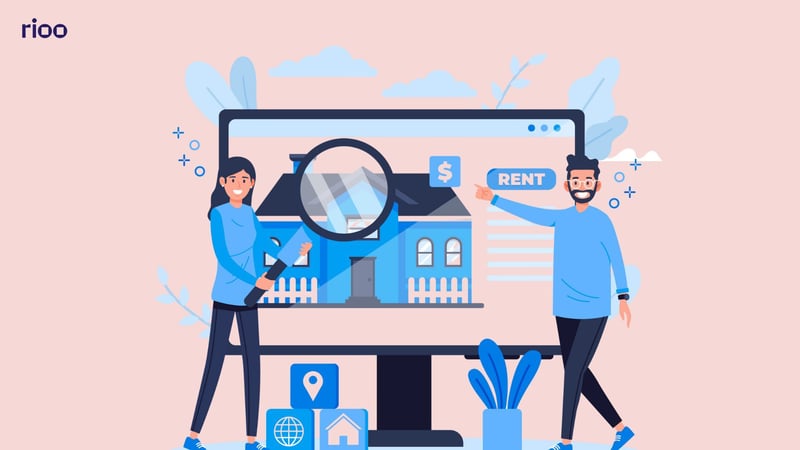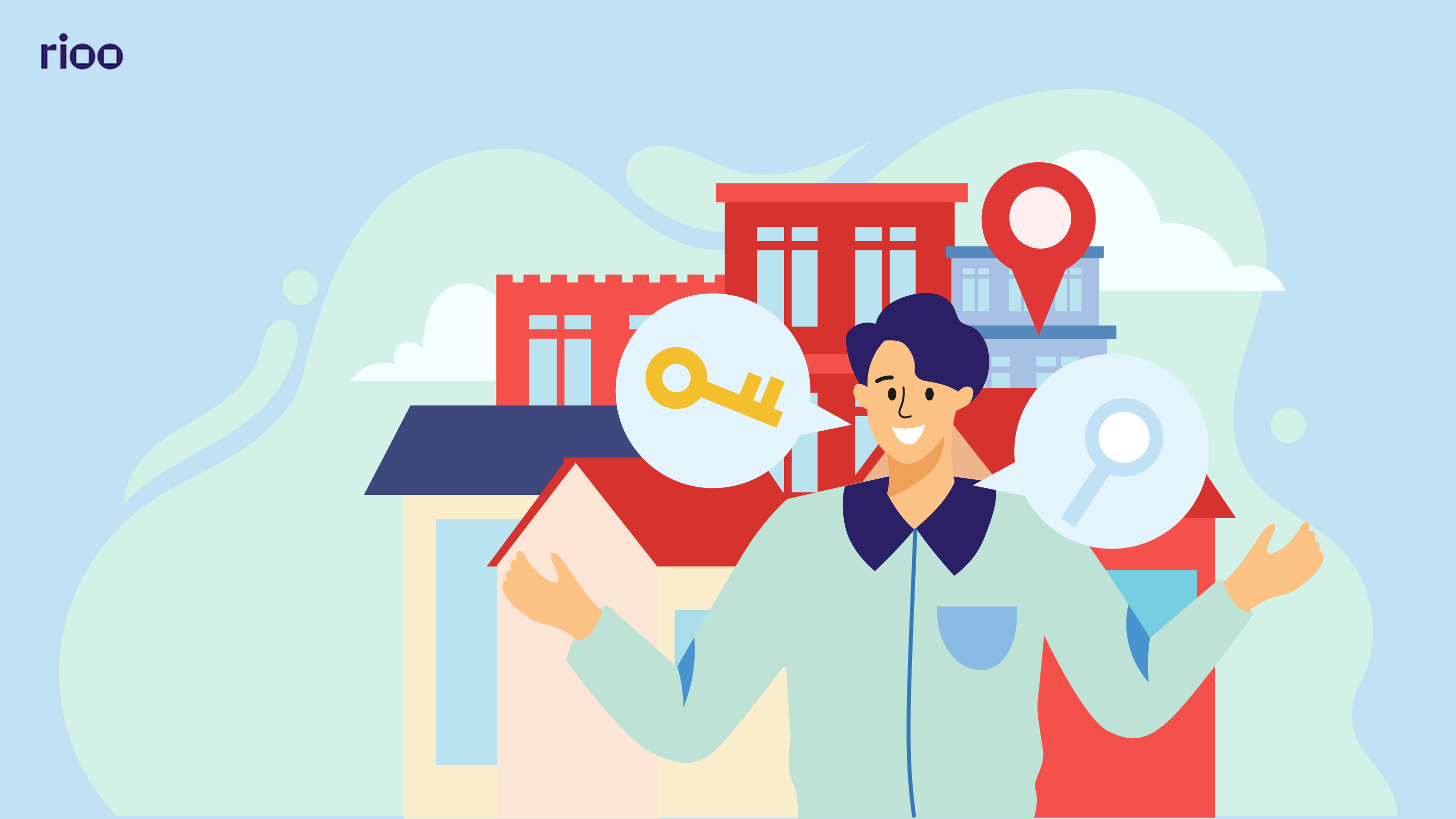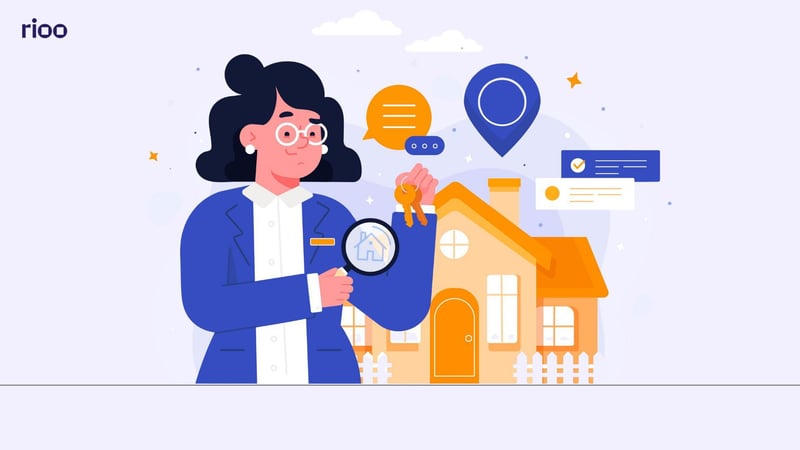Managing properties, whether residential or commercial, involves juggling tasks like finding tenants, collecting rent, and handling maintenance. This can quickly become overwhelming. Property management software acts as your digital assistant, automating these tasks to save you time and reduce errors.
A 2023 poll by the National Apartment Association found that 68% of property managers in North America already use property management software, underscoring its growing importance in the industry. If you’re not yet using it, you’re missing out on improved efficiency, better tenant satisfaction, and greater profitability.
In this blog, we’ll explore what property management software is, its key features, and how it can simplify your property management.
Quick Takeaways
-
Property Management Software (PMS) centralizes and automates tasks for efficient property oversight.
-
It offers key features like tenant, rent, lease, and maintenance management, along with robust reporting and tenant screening.
-
Designed for a wide range of users, from individual landlords to large property management companies, across various property types (residential, commercial, industrial).
-
Benefits include streamlined operations, improved financial tracking, enhanced communication, and better decision-making.
-
Consider PMS when your portfolio grows, admin tasks overwhelm, or you need better visibility and a professional tenant experience.
-
Platforms like RIOO provide an all-in-one solution to simplify and elevate property management.
What is Property Management Software?
Property management software is a specialized application designed to help property managers, landlords, and real estate professionals efficiently handle the day-to-day operations of their rental properties.
It centralizes various administrative, financial, and operational tasks into one cohesive system. This means you can move beyond scattered spreadsheets, manual ledgers, and endless paperwork, bringing all your property-related activities into a digital, organized environment.
From lease agreements to maintenance logs and tenant communications to financial reporting, this software acts as a comprehensive hub, simplifying your workflow and reducing the potential for errors. It's about bringing clarity and control to what can often be a very complex business.
What are the key features of Property management software?
When you consider adopting property management software, you're looking for a robust toolset that covers the breadth of your responsibilities.
Here are the top features you can look for in property management software, each designed to make your life easier:
-
Tenant Management: This is the heart of the system, and a poor tenant management system will cost you a lot. You can store tenant contact information, lease details, payment history, and communication logs.
-
Rent Collection & Accounting: Automate rent reminders, accept online payments, track overdue rent, and generate detailed financial reports. This feature often integrates with accounting tools to simplify bookkeeping.
-
Lease Management: Create, store, and manage lease agreements digitally. You can set up automated reminders for lease renewals and track lease terms effortlessly.
-
Maintenance & Work Order Management: Tenants can submit maintenance requests online, which you can then assign to contractors, track progress, and manage payment for repairs. This centralizes communication and ensures timely resolution.
-
Property Marketing & Vacancy Management: Many platforms offer tools to list vacant properties on various rental websites, manage inquiries, and track leads, helping you fill vacancies faster.
-
Reporting & Analytics: Generate comprehensive reports on financials, occupancy rates, maintenance costs, and more. These insights are invaluable for making informed business decisions.
-
Communication Tools: Built-in messaging systems, email templates, and tenant portals facilitate seamless communication between you, your tenants, and your vendors.
-
Document Storage: Securely store all essential documents such as lease agreements, inspection reports, and invoices in a cloud-based system, accessible from anywhere.
-
Tenant Screening: Integrate with background check services to efficiently screen potential tenants, including credit checks, criminal history, and eviction history.
Wondering how these powerful features come together in one seamless platform? Book a demo to explore RIOO's comprehensive suite and simplify your property management today.
Who is it meant for?
Property management software isn't a one-size-fits-all solution, but rather a versatile tool that caters to a diverse range of professionals and property owners.
If you find yourself spending excessive time on administrative tasks related to your properties, this software is likely for you. Specifically, it's designed for:
-
Individual Landlords: If you own a few rental properties and manage them yourself, this software can free up significant time, helping you stay organized and professional without needing a large team.
-
Property Management Companies: For businesses managing multiple properties for various owners, the software provides the scalability and robust features needed to handle a large portfolio, ensuring consistent service and efficient operations.
-
Real Estate Investors: Those with a growing portfolio of investment properties can use the software to track performance, manage tenants, and oversee maintenance across all their assets, helping them make data-driven decisions.
-
Homeowners Associations (HOAs) and Community Managers: While their needs differ slightly from rental properties, many property management software solutions offer modules specifically for managing common areas, collecting dues, and facilitating community communication.
-
Commercial Property Managers: Managing office buildings, retail spaces, or industrial parks comes with its own set of complexities. The software can help with lease tracking, common area maintenance (CAM) charges, and tenant relations specific to commercial leases.
If you're involved in the oversight, leasing, or maintenance of any real estate, and you're looking to enhance efficiency, reduce manual errors, and improve tenant satisfaction, property management software is designed with your needs in mind.
What are the types of Property Management software?
Property management software isn't a single entity; it comes in various specialized forms, each tailored to specific property types or management needs.
Understanding these distinctions will help you pinpoint the solution that best aligns with your portfolio:
1. Residential Property Management Systems
These systems are designed for the efficient management of residential properties, ranging from single-family homes and individual apartments to large multi-unit complexes. They typically focus on features like tenant and lease record-keeping, streamlined rent collection, and maintenance request handling specific to residential living.
2. Commercial Property Management Systems
Geared towards managing commercial assets such as office buildings, retail spaces, and industrial properties. This software often includes advanced features for complex lease structures, common area maintenance (CAM) reconciliations, and detailed expense tracking relevant to commercial operations.
3. Hotel Management Systems (PMS)
Specifically built for the hospitality sector, these systems manage hotels, resorts, and other lodging establishments. Key functionalities include guest profiles, front office operations (check-in/out), revenue management, and inventory control for rooms and amenities.
4. Industrial Property Management Systems
These cater to the unique demands of industrial properties like warehouses, distribution centers, and manufacturing facilities. They often incorporate features for facility maintenance, tenant coordination regarding operational needs, and compliance management for industry-specific regulations.
5. Specialized Property Management Tools
Beyond these broad categories, you'll also find software or modules focused on niche areas:
-
HOA/Community Management: For homeowners' associations, managing common areas, dues, and community communications.
-
Short-Term/Vacation Rental Management: Integrating with booking platforms, managing guest turnovers, and optimizing pricing for short stays.
-
Property Inspection and Maintenance Software: Dedicated tools for scheduling, tracking, and managing property inspections and maintenance tasks.
-
Real Estate Marketing & Listing Management: Software that helps you advertise vacancies across multiple platforms and manage inquiries.
-
Property Valuation and Analysis Tools: For estimating property values and analyzing market trends.
Choosing the right type depends on the specific nature of your properties and the scale of your operations.
What are the benefits of using Property Management Software?
Adopting property management software does more than digitize processes. It unlocks significant advantages that transform your operations.
Here's how you stand to benefit:
1. Easy maintenance monitoring
-
Say goodbye to frantic phone calls and misplaced repair requests.
-
Tenants can submit maintenance requests online, often with photos, directly through a portal.
-
You can easily assign tasks to contractors, track their real-time progress, and manage payments.
-
This ensures quick and efficient issue resolution, keeps everyone informed, and reduces tenant frustration.
2. Easy payments from tenants and contractors
-
Simplify your financial transactions significantly.
-
The software enables seamless online rent collection from tenants, offering various payment options.
-
It automates reminders for due dates.
-
For contractors, you can manage invoices, track payments, and maintain clear expense records.
-
This streamlines bookkeeping and reduces the chances of missed payments or accounting errors.
3. Data tracking
-
At its core, property management software is a powerful data hub.
-
It meticulously tracks every piece of information: properties, tenants, leases, and financials.
-
This centralized data allows you to generate comprehensive reports on occupancy rates, rental income, maintenance costs, and tenant turnover.
-
With this wealth of organized data, you gain invaluable insights for making informed decisions and optimizing your portfolio's performance.
4. Centralized property management
-
Centralized property management improves efficiency for landlords and managers by providing a holistic view of your entire property portfolio.
-
You can easily access details for each unit, including lease terms, tenant history, and maintenance records.
-
This centralized portal empowers you to oversee multiple properties from a single dashboard.
-
It ensures nothing falls through the cracks and allows you to maintain a high standard of care across all your assets.
5. 24/7 support
-
Many modern property management software solutions offer robust support channels, often including 24/7 access to resources or direct assistance.
-
This means you have help available whenever you need it.
-
Whether troubleshooting an issue, understanding a feature, or getting guidance on best practices, continuous support ensures your operations run smoothly with minimal downtime.
6. Quick inspection
-
Streamline property inspections with dedicated tools within the software.
-
You can schedule inspections, create digital checklists, capture photos, and document findings directly from your mobile device.
-
This makes the inspection process faster and more thorough.
-
It also creates a clear, digital record of property conditions, invaluable for move-in/move-out processes and dispute resolution.
7. Tenant screening
-
Finding the right tenants is crucial for successful property management.
-
The software integrates with tenant screening services.
-
This allows you to conduct comprehensive background checks, credit checks, and eviction history reports quickly and efficiently.
-
This automated process helps you make informed decisions, mitigate risks, and select reliable tenants.
Also Read: How a Property Management Platform Can Simplify Tenant Screening and Onboarding
8. Enhances visibility
-
By centralizing all your property data and operations, the software provides unparalleled visibility into your portfolio's performance.
-
You can see real-time financial snapshots, track key metrics, and identify trends.
-
This enhanced visibility allows you to proactively address issues, capitalize on opportunities, and gain a clearer understanding of your business's health.
9. Calendar scheduling
-
Managing appointments, inspections, maintenance tasks, and lease renewals can be a logistical nightmare without proper organization.
-
Property management software often includes integrated calendar and scheduling tools.
-
This allows you to plan and track all property-related events easily.
-
Automated reminders ensure you never miss an important deadline or appointment.
Imagine achieving all these benefits and more effortlessly. RIOO is designed to help you unlock peak efficiency and profitability in your property portfolio.
10. Better reporting
-
Beyond basic financial reports, property management software offers advanced reporting capabilities.
-
You can generate customized reports on various aspects of your operations: vacancy rates, marketing effectiveness, maintenance expenditures, and tenant demographics.
-
These detailed insights empower you to analyze performance, identify areas for improvement, and make data-driven strategic decisions for your business growth.
Also Read: From Spreadsheets to Smart Reporting: Why Modern Property Managers Need Automated Financial Insights
When do you need property management software?
The decision to invest in property management software often comes down to recognizing specific pain points in your current operations. While there's no single magic number of properties that dictates the need, several indicators suggest it's time to leap:
-
Your portfolio is growing: If you're managing more than a handful of properties, manual methods quickly become unsustainable. As your portfolio expands, so does the administrative burden. Software scales with you, preventing overwhelm.
-
You're spending too much time on administrative tasks: Are you drowning in paperwork, chasing rent payments, or constantly organizing maintenance requests? If administrative duties are consuming a significant portion of your day, diverting you from more strategic tasks, software can automate and streamline these processes.
-
You're struggling with financial tracking: If your accounting is a mess of spreadsheets, or you're unsure about your true profitability, software with integrated accounting features provides clarity and accuracy. This is especially critical for tax season and financial planning.
-
Communication with tenants or contractors is inconsistent: Missed messages, delayed responses, or a lack of clear communication channels can lead to frustrated tenants and inefficient maintenance. A centralized communication platform within the software solves these issues.
-
You're experiencing high vacancy rates or difficulty finding tenants: Effective marketing and tenant screening are crucial. Suppose your properties are sitting vacant for too long or you're struggling to find qualified applicants. In that case, the marketing and screening tools in property management software can significantly improve your success rate.
-
You lack a clear overview of your property performance: Without consolidated data and reporting, it's hard to make informed decisions. If you can't easily access key metrics like occupancy rates, maintenance costs, or rental income trends, software provides the insights you need to optimize your business.
-
You want to offer a more professional tenant experience: Modern tenants expect convenience, including online payment options, easy maintenance requests, and clear communication. Software helps you meet these expectations, enhancing tenant satisfaction and retention.
If you feel your current property management methods are holding you back from growth, efficiency, or providing the best possible service, it's time to consider property management software. It's an investment that pays dividends in time saved, reduced errors, and improved profitability.
If any of these scenarios resonate with you, it's a clear sign that a robust solution is needed. Discover how RIOO can be the strategic partner you need to overcome these challenges and drive your property business forward.
Conclusion
Property management software is a necessity for anyone serious about optimizing their real estate portfolio.
From automating routine tasks and streamlining communication to providing invaluable data insights and enhancing the tenant experience, it empowers you to manage your properties with unprecedented efficiency and professionalism.
By embracing this technology, you free up your valuable time, reduce costly errors, and position yourself for sustainable growth in a competitive market. It's about transforming the complexities of property management into a seamless, controlled, and profitable endeavor.
Experience Seamless Property Management with RIOO
At RIOO, we understand the multifaceted challenges of property management. That's why we've designed our platform to be your go-to for seamless, all-in-one property management. RIOO empowers you to:
-
Centralized Operations: Manage all your properties, tenants, and financials from a single, intuitive dashboard.
-
Streamline Payments: Automate rent collection and expense tracking, making financial management effortless.
-
Simplify Maintenance: Handle requests, assign tasks, and track progress efficiently through a dedicated system.
-
Enhance Tenant Experience: Utilize features like tenant portals for communication, payments, and maintenance requests, fostering better relationships.
-
Gain Key Insights: Access comprehensive reporting and analytics to make data-driven decisions for your portfolio's growth through our dashboards and reports features.
-
Manage On-the-Go: Leverage our mobile app for flexible management from anywhere, anytime.
RIOO is built to simplify complex tasks, reduce errors, and free up your valuable time, allowing you to focus on what truly matters: maximizing your property's potential.
Book a free demo today to explore how we can elevate your operations.
Frequently Asked Questions
Q. What is the primary purpose of property management software?
A. The primary purpose of property management software is to centralize and automate the various administrative, financial, and operational tasks involved in managing rental properties. This includes everything from rent collection and lease management to maintenance tracking and tenant communication, ultimately aiming to improve efficiency, reduce manual errors, and enhance profitability.
Q. Can property management software help with tenant screening?
A. Yes, most modern property management software solutions integrate with tenant screening services. This allows you to efficiently conduct background checks, credit checks, and eviction history reports on prospective tenants, helping you make informed decisions and mitigate risks.
Q. Is property management software suitable for small landlords with only a few properties?
A. Absolutely. While larger property management companies benefit immensely from the scalability of these solutions, individual landlords with even a few properties can significantly reduce their administrative burden, streamline operations, and enhance professionalism by using property management software. It saves time, reduces errors, and helps maintain organized records.
Q. What kind of reports can I generate with property management software?
A. Property management software typically offers comprehensive reporting capabilities. You can generate reports on financials (income, expenses, profitability), occupancy rates, tenant turnover, maintenance costs, lease expirations, and more. These reports provide valuable insights for strategic decision-making and performance analysis.
Q. Is my data secure with cloud-based property management software?
A. Reputable cloud-based property management software providers prioritize data security. They typically employ advanced encryption, regular backups, and robust security protocols to protect your sensitive information. Always choose a provider with a strong track record and clear security policies.
















